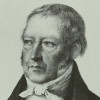“ Therefore human law does not bind a man in conscience. ”
Thomas Aquinas, Summa Theologica (1274). copy citation
| Author | Thomas Aquinas |
|---|---|
| Source | Summa Theologica |
| Topic | conscience law |
| Date | 1274 |
| Language | English |
| Reference | |
| Note | Translated by Fathers of the English Dominican Province |
| Weblink | http://www.gutenberg.org/cache/epub/17897/pg17897-images.html |
Context
“Further, the judgment of conscience depends chiefly on the commandments of God. But sometimes God's commandments are made void by human laws, according to Matt. 15:6: "You have made void the commandment of God for your tradition." Therefore human law does not bind a man in conscience.
Obj. 3: Further, human laws often bring loss of character and injury on man, according to Isa. 10:1 et seqq.: "Woe to them that make wicked laws, and when they write, write injustice; to oppress the poor in judgment, and do violence to the cause of the humble of My people."”
source



